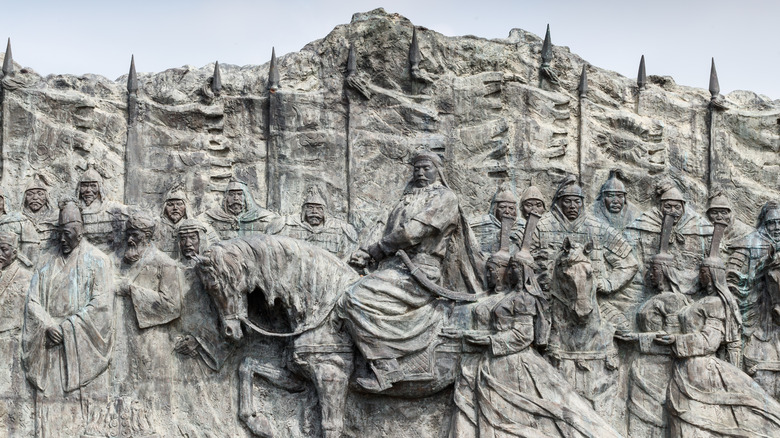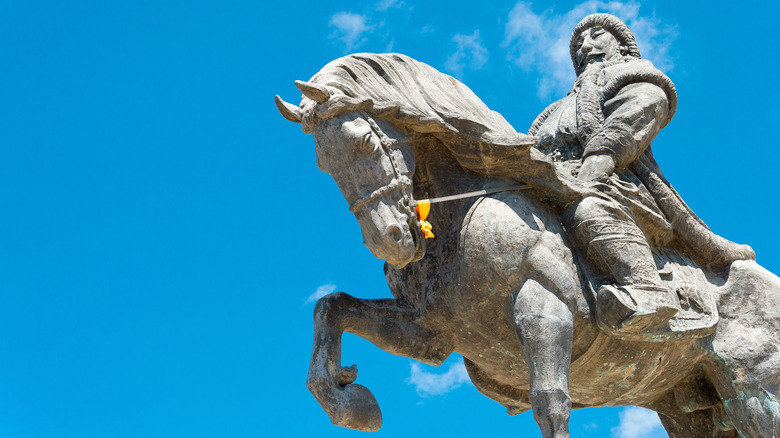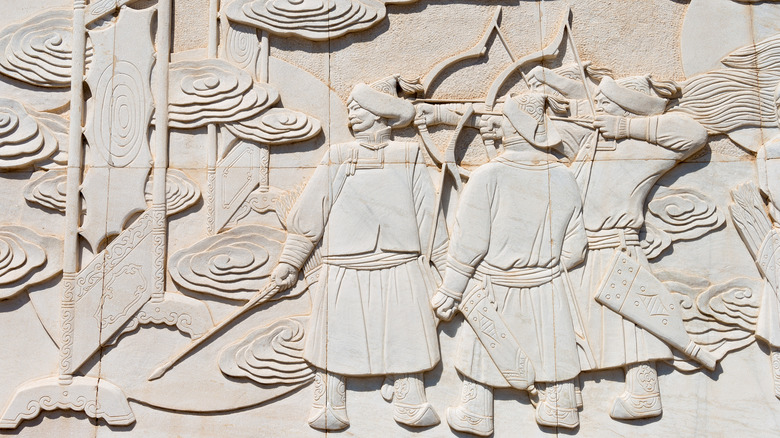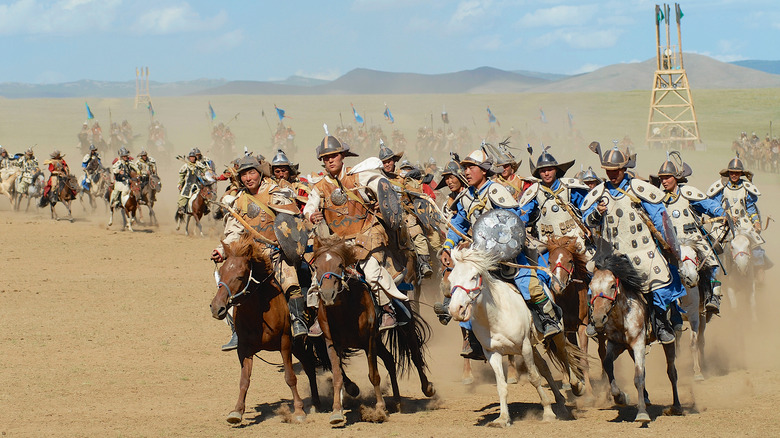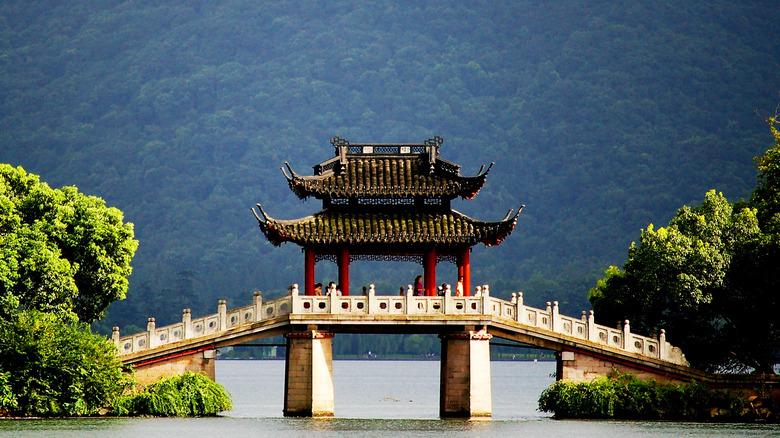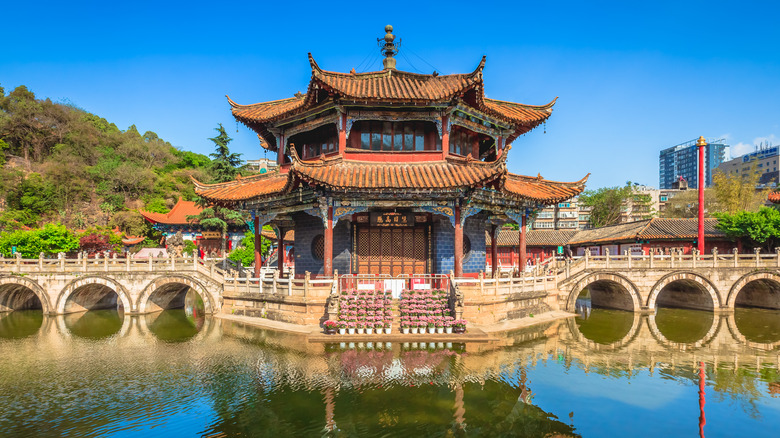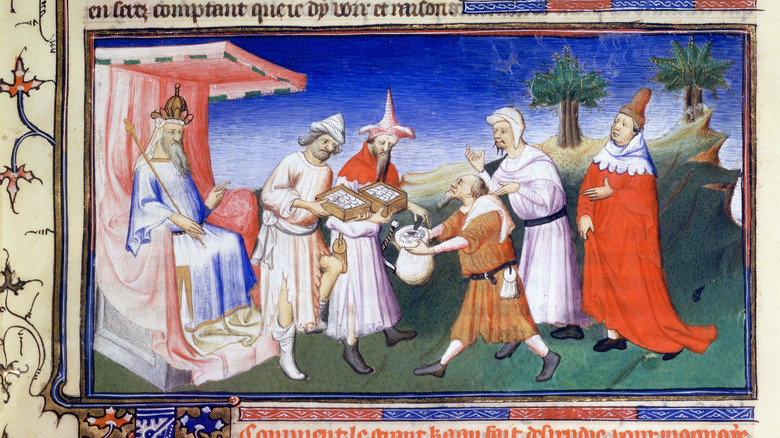How Kublai Khan Finished What Genghis Khan Started
Genghis Khan was a legendary military leader, warrior, and founder of the Mongolian Empire. The Mongolian Empire stretched from Eastern Asia to Central Europe at its height, making it the world's largest empire connected by land, says Live Science. One of Genghis' many strengths was his ability to envision never-before-seen conquests and expansions of power.
Genghis Khan came from a humble childhood of which little is known, writes Britannica. His harrowing rise to power hints that he was a visionary from the start. Though he came from a somewhat prestigious lineage, his father was murdered when he was a child, leaving his mother and siblings in extreme poverty. Sources suggest that his powerful personality helped him quickly gain allies and climb to a place of power and prestige. No longer was he struggling to find food. Instead, a celebrated warrior and leader, Genghis set his sights on something new to the nomadic Mongolian people — a united Empire (via History).
In 1206, Genghis Khan succeeded in his dream of consolidating the disparate nomadic tribes of the Mongolian Steppe into one military and governing power (per Britannica). Yet, this newly created empire only set in motion his next plan: world domination (per National Geographic). By using brutal psychological warfare methods — a combination of terror and demoralization — and tactical slaughter, Genghis' empire spread (per Britannica). By the time of his death in 1227, he left his descendants a sprawling empire of unprecedented power and size (via BBC).
Kublai Khan inherits Genghis Khan's unrealized dream
Southern China's Song Dynasty eluded Genghis Khan's grasp during his lifetime. At his death, Genghis passed to his descendants the yet-unrealized dream of conquering the Song Dynasty and his desire to expand the already mighty Mongolian Empire (per National Geographic). While many of the Great Khans after Genghis successfully expanded the empire, the Song Dynasty remained unattainable. Roughly 50 years after Genghis' death, his grandson Kublai Khan finally added south China and the Song Dynasty to the Mongolian Empire's control (via NSCWPS). While still violent in battle and at times unjust in subjugation, Kublai's approach favored religious tolerance and integration rather than eliminating Chinese culture.
Born in 1215, Kublai Khan's unique approach to his grandfather's empire-building business began with his education overseen by his mother (per National Geographic). Married to Ghenghis Kahn's son Tolui, Kublai's mother, Sorkhotani Beki, came from a powerful Mongolian family and was a princess in her own right (via History). Sorkhotani Beki oversaw Khan's education, influenced by Chinese and Mongolian culture. He learned Mongolian hunting and war tactics and Chinese philosophy and customs (via Emory Journal of Asian Studies). His mother ensured his instructors and lessons were diverse, and his years of study introduced Kublai to the many religions of his family's empire, including Buddhism, Taoism, and Islam, writes National Geographic. This education positioned him as a formidable opponent to China yet also one with a deep knowledge of Chinese customs and tradition.
The makings of a Great Khan
During Kublai Kahn's young adulthood, his uncle Ögedei Khan, Ghenghis Khan's successor, oversaw the Mongolian Empire's most significant period of expansion (per UNESCO). Ögedei included Kublai in his efforts, giving him his first responsibilities as a leader and a governor (via History). Per Ögedei's orders, Kublai oversaw a small region in the modern-day Hopei province of northern China near today's Beijing (per NSCWPS). This experience taught him the importance of his involvement in the day-to-day affairs of his lands.
Kublai didn't live in Hopei and delegated responsibilities to other Mongolian leaders. Kublai's delegates, left to their own devices, raised taxes to such a high amount that many people left the region, unable to pay. Upon hearing this, Kublai took on a more active role in governing Hopei and replaced the Mongolian leaders with Chinese representatives who were able to bring back those who fled and maintain order (per History). After that lesson, Kublai surrounded himself with those that understood leadership, rule, and the people of the land. He brought in advisors from around the world to counsel him, hailing from China, Turkey, and Central Asia. Their religious and philosophical views ranged from Christianity, Islam, Buddhism, and Confucianism (via Encyclopedia.com).
Kublai sets his sights on China
In 1251, Kublai Kahn's brother Möngke ascended to the role of Great Khan. Given Kublai's reputation as a successful leader, Möngke tasked Kublai with overseeing Northern China (per (National Geographic). Möngke hadn't forgotten his grandfather's hope for a Mongolian Empire that included Southern China. As a part of Möngke's efforts, he gave Kublai the task of overtaking the Yunnan region of China, which is in the southwest, near Laos and Myanmar (Burma), writes World History. Kublai took his first military assignment seriously, preparing for a year before setting out on the three-year campaign. His preparation paid off, and his first military assignment was a success, explains History.
After his win in the south, Kublai became responsible for a much larger territory. Because of that, he saw the need to create a new capital for the expansive region under his rule. He understood that building a grand capital would show a dedication to his new people, especially if he went about it by their customs. So, he used the Chinese practice of feng shui to select the precise location of his capital, says Dr. William Romain in Time and Mind (via Research Gate). Strategically, he set up the stronghold in the north of China within reach of the Mongolian grasslands and Chinese farmlands. He named the area Shang-tu, which means "upper capital," per History. Later, Europeans called the city Xanadu.
A fight for the throne
According to Britannica, Möngke died in 1259 while fighting the still independent Song Dynasty, attempting to realize his grandfather's wish. In response, Kublai Kahn's other brother Ariq Boke appointed himself Great Khan. However, Kublai saw himself as the rightful successor, so he made a plan to return to the Mongolian Steppe and challenge his brother's authority (per NSCWPS). Before he set out, Kublai consulted the "I Ching," a Chinese book of ritual divination with Confucian and Taoist roots (via Stanford Encyclopedia of Philosophy). Using the book to predict his victory, his ascent to power would have greater support amongst his conquered people (per National Geographic). In doing so, he used his knowledge of Chinese culture to his advantage.
Kublai named himself Great Khan in 1260, but a civil war with his brother's forces raged until 1264, when Ariq Boke surrendered (per History). Though the feud had officially ended, their cousin Kaidu refused to acknowledge Kublai's legitimacy. Kaidu sowed doubt and caused persistent tension for the rest of his life. This hostility would contribute to the eventual cracking of the Mongolian empire after Kublai's death, writes Biography.
Kublai Khan overtakes the Song Dynasty
After Kublai Kahn's victory against Ariq Boke, he set forth a plan to unite all of China under the rule of the Mongolian Empire and finally realize Genghis Khan's dream (via National Geographic). While the next several years fighting the Song were grueling, the Chinese underestimation of the Mongolians aided Kublai's efforts. The Song Dynasty elites considered the Mongolians uncivilized outsiders, explains BBC. According to Kublai Khan biographer John Man, "For the Song, it would been absolutely inconceivable that the Mongols could take over the whole of China." However, the Mongolians benefitted from the decades of knowledge cultivated from their ever-spreading empire, including the terrifying war tactics learned from Kublai's grandfather Genghis Khan, says Biography.
Additionally, Kublai used technologies and innovations learned from the distant cultures the Mongolians had encountered in their conquests. During the multi-year-long slog to defeat the fortified city of Xianyang — often equated to the Trojan War — Kublai achieved victory by using European-style catapults acquired from the empire's far reaches (per "The Mongol Empire"). With Xianyang taken, the Mongols moved into Southeast China. By 1279, Kublai Kahn and his empire finally ruled over all of China (via National Geographic). The Song leadership was surprised that the so-called barbarians from the northern grasslands actually took over. The emperor, a child at the time, died by suicide as a result, as was the case with many other high-ranking Song Dynasty members (via BBC).
Kublai Khan's Yüan Dynasty
Kublai Khan understood that to rule as an outsider effectively, he had to learn and practice their ways of life (per Encyclopedia.com). After defeating the Song Dynasty, Kublai infused his leadership with Chinese culture and customs to appease his new subjects and maintain order. Following Chinese tradition, he created his own dynasty naming it the Yüan Dynasty. Yüan, meaning "great origin," is derived from a quote in the "I Ching" (via the University of Cambridge).
Additionally, Kublai moved the capital to modern-day Beijing, says History. The move to Beijing centralized Kublai's sphere of power. There, he maintained many Chinese ruling systems and government structures on a local and large scale (per Columbia University). He also reinstated the Confucian court practices of dance and music and even dressed in Chinese fashion (per National Geographic). Following the Chinese customs for honoring the dead, he created temples for his ancestors, including Genghis Kahn. In this way, Kublai's China looked different than China would have under his grandfather's violent rule.
During Kublai's rule, he bolstered protection for silk road trading routes throughout the Mongolian Empire's vast lands. This added safety and a halt on taxes for foreign traders encouraged the spread of goods, reports UNESCO. As a result, China inherited many foreign objects and customs that today people consider Chinese, such as the toggle and loop button. Also, Chinese medicine draws on Islamic medicine shared through the Yüan Dynasty's cross-continental information routes (via BBC).
An Empire's Decline
Though he used Chinese tradition as a leadership strategy, Kublai Khan's China was rife with social inequality, and he did not try to integrate into Chinese culture fully. Instead, the elite Mongolian leaders maintained their Mongolian identity, leading to a divide between the Mongolian elite and the Chinese lower classes (via History). The Mongolian upper classes thrived, while the Chinese bore the brunt of the labor. Chinese workers supported the empire through heavy taxes, and Kublai created a class threshold that Chinese people couldn't overtake, no matter their skill, causing resentment (per National Geographic). Furthermore, the Mongolian officials felt threatened by how Kublai embraced the Chinese culture openly. They grew envious of how Kublai put outsiders and international experts — including the Venetian Marco Polo — in high government positions. These tensions, coupled with severe losses in Japan and Java, weakened Kublai's empire, reports BBC.
Distraught by the death of his son and his wife, Kublai fell into a depression in late life. His health declined, as did the strength of his empire. After his death at 79 years old in 1294, Kublai joined his grandfather in Mongolia's Great Khan burial site. The generations of Great Khans who had sought to overtake China lay underground. By 1368, the Mongolian empire had fractured, and the Ming Dynasty replaced Kublai's Yüan Dynasty. Though Genghis Khan's dream lay buried, Great Khan's reign forever changed China.
